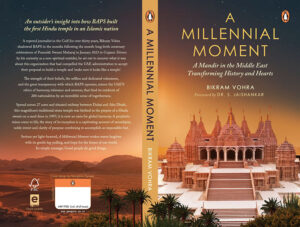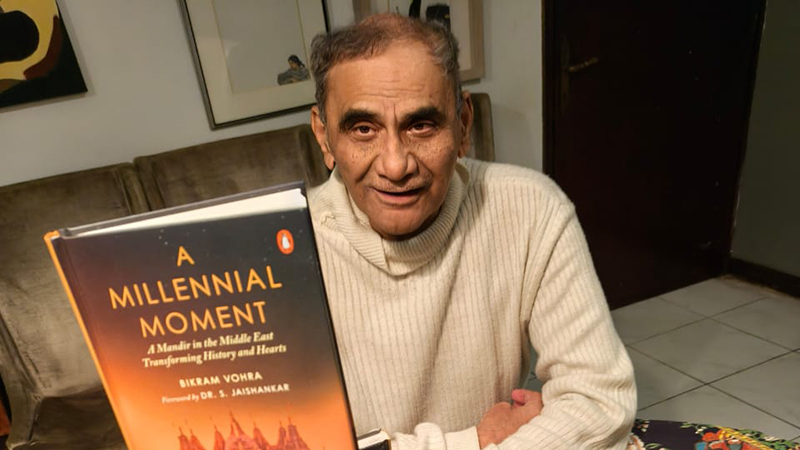Bikram Vohra has a special connection with the UAE, where he first arrived in 1984. In a time when hot metal presses were still all the rage, and digital journalism was perhaps just a sci-fi fantasy, he went on to chart a prolific media career that included stints as Editor of two of the country’s flagship English newspapers, Gulf News and Khaleej Times. As a leading journalist who over decades has witnessed the UAE’s evolution as a globally highlighted symbol of multiculturalism, harmony and tolerance in the region, an invitation to write a book about the story behind one of the country’s newest cultural landmarks, the BAPS Hindu Mandir in Abu Dhabi, proved too tempting to resist.
The first traditional Hindu temple to be built in the UAE, the BAPS Hindu Mandir has been described by its founding organization, the BAPS Swaminarayan Sanstha, as “an architectural marvel that pays homage to millennia of diverse forms of Hindu spirituality as well as countries, cultures and civilizations from around the world.”
Vohra’s new book, ‘A Millennial Moment – A Mandir in the Middle East Transforming History and Hearts’, was launched during the inauguration of the BAPS Hindu Mandir on February 14, 2024. In spite of having a “more spiritual than religious” mindset, he says he was inspired to write the book. “When I met Swami Brahmaviharidas, who spearheaded the journey of the BAPS Hindu Mandir in Abu Dhabi, we had a nice conversation. I’m not particularly – as the Swami kept teasing me – ‘spiritual’, but I was curious. So, I was certainly not ‘To the Manor Born’ to write this book! I told him that I would love to do it, but I wasn’t an expert!”
Vohra, popular for his humorous musings in the syndicated column ‘Between the Lines’, admits to being intrigued by the Sanstha’s “Western” approach and the fact that its leaders did not conform to commonly perceived ideas of religious clergy. He was told by Swami Brahmaviharidas, “an erudite person around who you have to mind your Ps and Qs”, that a “commissioned” book was not what they were looking for, rather someone “who just writes what he sees.”
Vohra recalls jokingly answering, “Just as much as no one has more rights to preach than the sinner, no one has more rights to write this book than someone who doesn’t exactly disturb the lord by knocking on his door too often!” He adds that while he does go through the rituals of festivals and important days in a year, he always has a feeling that god is telling him to “go on, get on with it.”
“So, from that point of view, I was a complete novice, and the book was therefore written from outside the tent, looking in. I had to find out who these BAPS people are and what makes them tick. There are thousands of volunteers at over 1,100 temples around the world; many of them are from 9 to 5 or senior corporate jobs, and they just give up everything – all the good things of life. That makes you wonder,” says Vohra.
This journey of discovery that unfolded parallel to writing the book – penned in Vohra’s trademark light-hearted style – was an insightful one, he reveals. “I was taken to a couple of temples in Ahmedabad, Gandhinagar and Nadiad, where I met Mahant Swami Maharaj, the spiritual leader of BAPS. It (the experience) was amazing.”
He describes the process of writing ‘A Millennial Moment’ as “an unusual exercise, which took about a year.”
“I love writing humour, and the book is quite humorous actually! It’s not a heavy tome that’s going to intimidate you into surrender.”
As he was given the freedom to “write what he wanted”, Vohra appreciates that every philosophical conversation and new discovery, even a bit of gentle teasing or “taking the mickey” out of his new acquaintances, which “they took in their stride”, all blended seamlessly together to provide some unique inputs for the book.
Perhaps unsurprisingly, the foreword to the book packs a formidable political punch. Vohra quips, “I’d like to take credit that Dr. S. Jaishankar – India’s Minister of External Affairs – threw his might into the ring and wrote the foreword, but I can’t; I’d love to say that I got through to him and he said, ‘wow, yes of course’, but that’s not true! I’m sure it was the BAPS people who got it done!”

Having visited the BAPS Hindu Mandir site in Abu Dhabi “many times” whilst writing the book, Vohra shares his thoughts on seeing the iconic structure coming up on the land generously gifted by the UAE President, His Highness Sheikh Mohamed bin Zayed Al Nahyan. “Full marks to the leadership of this country for not only allowing it, but actually encouraging it. It (the gesture) certainly generates harmony and promotes tolerance. Concepts like Ministry of Tolerance and Coexistence, Minister of Happiness etc., that exist in the UAE, give it a new dimension, don’t they? They actually mean what they are saying. It’s not just words.” He adds that it is “wonderful” how diverse faiths have found a harmonious platform in the UAE, “a small country with a big heart.”
While emphasising that he hasn’t “pandered to anyone” in the book, Vohra also praises the UAE’s enduring liberal approach to its media industry, recalling how the land lay when he first arrived in 1984. “We were foreigners, and the UAE allowed us to run the media; I think that kind of trust is very important. That spurred me on to write this book, where these sentiments have been mentioned to a certain extent.”
When asked whether writing the book has changed him in any way, Vohra says, “I think it’s age… you totter in antiquity, you become a little more sober or introspective, yeah? You don’t go around tilting at windmills like you once did; you soften a bit. Has this been a sort of cleansing experience, good for the soul, body and mind? It hasn’t been bad. But have I changed dramatically? I don’t think my daughters will say I have. My wife certainly won’t! As a learning experience, however, it was very positive.”
He hopes people will have the patience to read the book, the theme of which he says is “good people do good things.”
“I think we underestimate the power of understanding the significance of having harmony at different levels of our lives. Most of us are out of kilter; we’re out of balance. I’ve learned (from writing this book), that you must create a balance in your life. I’ve also learned about the power of friendship, and that family comes first!
“A millennial moment – the title of the book – is one special moment in a thousand years! According to Swami Brahmaviharidas, this Mandir will last a thousand years, and people will go around the world creating more happiness and peace. I responded: More power to your elbow!”
Vohra effortlessly switches to humour again while winding up. “I was hoping hundreds of people would call and say ‘please do our book too’ but nobody has yet!”
Bikram Vohra is the former Editor of Khaleej Times, Gulf News, Bahrain Tribune and Emirates Evening Post. His book ‘A Millennial Moment – A Mandir in the Middle East Transforming History and Hearts’ is published by Penguin India and is expected to be released in April 2024.


Leave a Reply